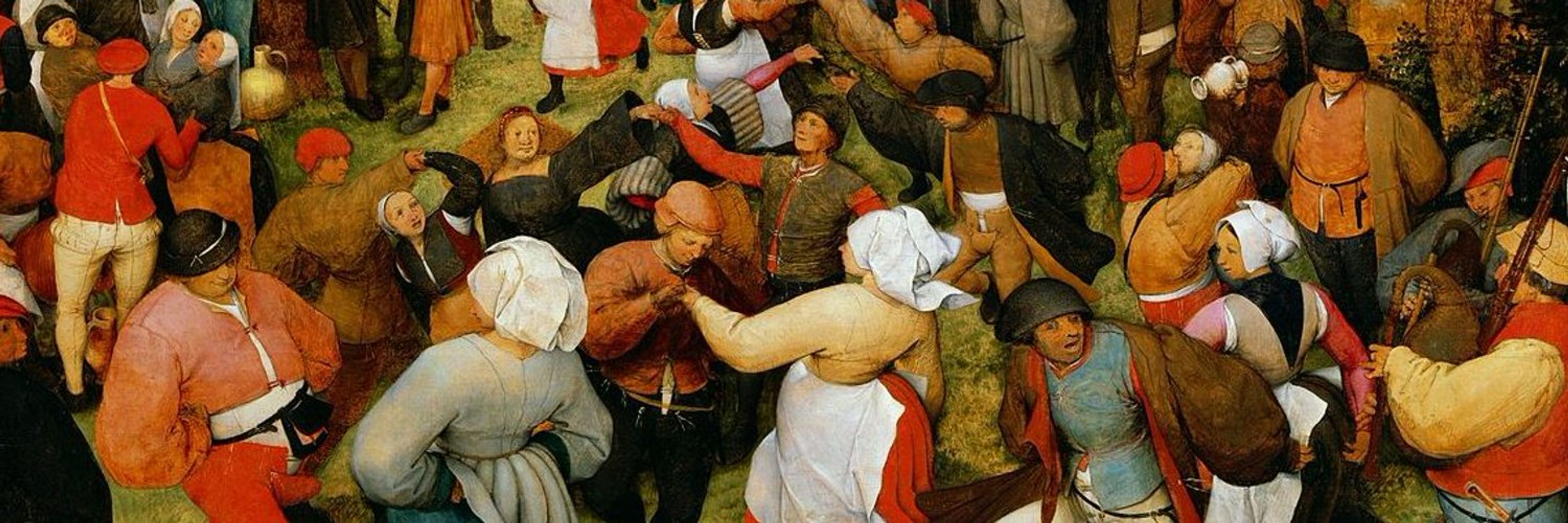
Johannes Wachs
@johanneswachs.bsky.social
Researching social computing, crowds, and networks at Corvinus University of Budapest and HUN-REN CERS.
More at: https://johanneswachs.com/
More at: https://johanneswachs.com/
Pinned
Johannes Wachs
@johanneswachs.bsky.social
· Nov 15
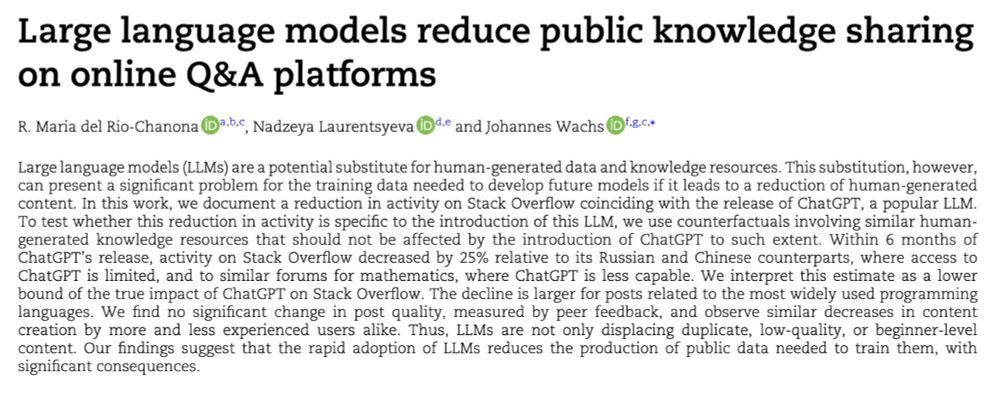
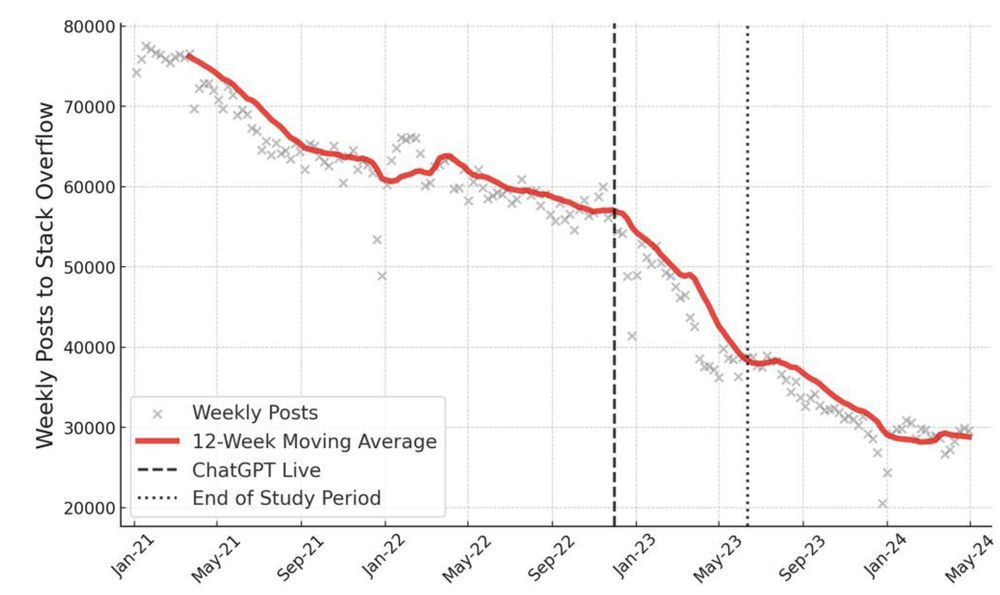
Our paper on the effect of ChatGPT on activity on @stackoverflow.com.web.brid.gy is out: academic.oup.com/pnasnexus/ar...
@maria-drc.bsky.social, Nadzeya Laurentsyeva & I find a 25% decrease in activity on SO within 6 months of #ChatGPT 's release vs counterfactuals.
Why does it matter?
@maria-drc.bsky.social, Nadzeya Laurentsyeva & I find a 25% decrease in activity on SO within 6 months of #ChatGPT 's release vs counterfactuals.
Why does it matter?
Reposted by Johannes Wachs
In a recent piece for the @wsj.com commentator @greg_ip cited a 2024 PNAS Nexus study by @johanneswachs.bsky.social + coauthors @maria-drc.bsky.social & N.Laurentsyeva showing that LLM can be a potential substitute for human-generated data & knowledge 📚
www.wsj.com/tech/ai/will...
www.wsj.com/tech/ai/will...

Will AI Choke Off the Supply of Knowledge?
More people turn to ChatGPT and other large language models for answers, but they don’t add to the stock of knowledge.
www.wsj.com
September 18, 2025 at 6:44 AM
In a recent piece for the @wsj.com commentator @greg_ip cited a 2024 PNAS Nexus study by @johanneswachs.bsky.social + coauthors @maria-drc.bsky.social & N.Laurentsyeva showing that LLM can be a potential substitute for human-generated data & knowledge 📚
www.wsj.com/tech/ai/will...
www.wsj.com/tech/ai/will...
Reposted by Johannes Wachs
In light of yet another scorching summer ☀️, new research by H. Schuster, A. Polleres, A. Anjomshoaa & @johanneswachs.bsky.social reveals how climate change 🌡️ + demographic aging 📈 intersect to shape health risks across Austrian districts.
Read the full story 👉 rdcu.be/eD5XV
Read the full story 👉 rdcu.be/eD5XV

Heat, health, and habitats: analyzing the intersecting risks of climate and demographic shifts in Austrian districts
Scientific Reports - Heat, health, and habitats: analyzing the intersecting risks of climate and demographic shifts in Austrian districts
rdcu.be
September 4, 2025 at 9:59 AM
In light of yet another scorching summer ☀️, new research by H. Schuster, A. Polleres, A. Anjomshoaa & @johanneswachs.bsky.social reveals how climate change 🌡️ + demographic aging 📈 intersect to shape health risks across Austrian districts.
Read the full story 👉 rdcu.be/eD5XV
Read the full story 👉 rdcu.be/eD5XV
Reposted by Johannes Wachs
“Our conservative model finds that going from 0→30 % AI share (US 2020-24) predicts 2.4 % increase in commits. Using task & wage data on occupations, this implies genAI creates $9-14 bill/year in US software alone. Larger estimates of effects from RCTs imply $100 billion.“
arxiv.org/abs/2506.08945
arxiv.org/abs/2506.08945

Who is using AI to code? Global diffusion and impact of generative AI
Generative coding tools promise big productivity gains, but uneven uptake could widen skill and income gaps. We train a neural classifier to spot AI-generated Python functions in 80 million GitHub com...
arxiv.org
June 12, 2025 at 8:47 PM
“Our conservative model finds that going from 0→30 % AI share (US 2020-24) predicts 2.4 % increase in commits. Using task & wage data on occupations, this implies genAI creates $9-14 bill/year in US software alone. Larger estimates of effects from RCTs imply $100 billion.“
arxiv.org/abs/2506.08945
arxiv.org/abs/2506.08945
Reposted by Johannes Wachs
Lots of neat stuff in this paper showing 30% of US python commits use AI
As of the end of 2024: “the annual value of AI-assisted coding in the United States at $9.6−14.4 billion, rising to 64−96 billion if we assume higher estimates of productivity effects reported by randomized control trials”
As of the end of 2024: “the annual value of AI-assisted coding in the United States at $9.6−14.4 billion, rising to 64−96 billion if we assume higher estimates of productivity effects reported by randomized control trials”



June 12, 2025 at 5:00 PM
Lots of neat stuff in this paper showing 30% of US python commits use AI
As of the end of 2024: “the annual value of AI-assisted coding in the United States at $9.6−14.4 billion, rising to 64−96 billion if we assume higher estimates of productivity effects reported by randomized control trials”
As of the end of 2024: “the annual value of AI-assisted coding in the United States at $9.6−14.4 billion, rising to 64−96 billion if we assume higher estimates of productivity effects reported by randomized control trials”
Reposted by Johannes Wachs
How much code now comes from AI? With @simonedaniotti.bsky.social, @xfeng.bsky.social & Frank Neffke we estimate that by end-2024 30% of Python functions pushed by US devs on GitHub are AI-generated. Adoption is rapid but diffusion lags globally. How did we do it? arxiv.org/abs/2506.08945



June 11, 2025 at 8:23 PM
How much code now comes from AI? With @simonedaniotti.bsky.social, @xfeng.bsky.social & Frank Neffke we estimate that by end-2024 30% of Python functions pushed by US devs on GitHub are AI-generated. Adoption is rapid but diffusion lags globally. How did we do it? arxiv.org/abs/2506.08945
How much code now comes from AI? With @simonedaniotti.bsky.social, @xfeng.bsky.social & Frank Neffke we estimate that by end-2024 30% of Python functions pushed by US devs on GitHub are AI-generated. Adoption is rapid but diffusion lags globally. How did we do it? arxiv.org/abs/2506.08945



June 11, 2025 at 8:23 PM
How much code now comes from AI? With @simonedaniotti.bsky.social, @xfeng.bsky.social & Frank Neffke we estimate that by end-2024 30% of Python functions pushed by US devs on GitHub are AI-generated. Adoption is rapid but diffusion lags globally. How did we do it? arxiv.org/abs/2506.08945
Reposted by Johannes Wachs
New paper out in Nature Communications 📌
@anetilab.bsky.social members @lgajo.bsky.social and @johanneswachs.bsky.social with @loreb92.bsky.social and Federico Battiston explore "The dynamics of leadership and success in software development teams" 👾
Link to paper ➡️ www.nature.com/articles/s41...
@anetilab.bsky.social members @lgajo.bsky.social and @johanneswachs.bsky.social with @loreb92.bsky.social and Federico Battiston explore "The dynamics of leadership and success in software development teams" 👾
Link to paper ➡️ www.nature.com/articles/s41...

The dynamics of leadership and success in software development teams - Nature Communications
Understanding how team dynamics impact performance in collaborative environments remains an open question. Here, authors use fine-grained activity data from software projects to characterize team evol...
www.nature.com
April 29, 2025 at 11:42 AM
New paper out in Nature Communications 📌
@anetilab.bsky.social members @lgajo.bsky.social and @johanneswachs.bsky.social with @loreb92.bsky.social and Federico Battiston explore "The dynamics of leadership and success in software development teams" 👾
Link to paper ➡️ www.nature.com/articles/s41...
@anetilab.bsky.social members @lgajo.bsky.social and @johanneswachs.bsky.social with @loreb92.bsky.social and Federico Battiston explore "The dynamics of leadership and success in software development teams" 👾
Link to paper ➡️ www.nature.com/articles/s41...
Reposted by Johannes Wachs
Happy to see this finally out in @natcomms.nature.com! 🎉
"The dynamics of leadership and success in software development teams"
www.nature.com/articles/s41...
Amazing collaboration with @lgajo.bsky.social, @johanneswachs.bsky.social and @fede7j.bsky.social
"The dynamics of leadership and success in software development teams"
www.nature.com/articles/s41...
Amazing collaboration with @lgajo.bsky.social, @johanneswachs.bsky.social and @fede7j.bsky.social

The dynamics of leadership and success in software development teams - Nature Communications
Understanding how team dynamics impact performance in collaborative environments remains an open question. Here, authors use fine-grained activity data from software projects to characterize team evol...
www.nature.com
April 28, 2025 at 11:07 AM
Happy to see this finally out in @natcomms.nature.com! 🎉
"The dynamics of leadership and success in software development teams"
www.nature.com/articles/s41...
Amazing collaboration with @lgajo.bsky.social, @johanneswachs.bsky.social and @fede7j.bsky.social
"The dynamics of leadership and success in software development teams"
www.nature.com/articles/s41...
Amazing collaboration with @lgajo.bsky.social, @johanneswachs.bsky.social and @fede7j.bsky.social
Reposted by Johannes Wachs
🎉 New publication in PNAS: Urban highways are barriers to social ties
www.pnas.org/doi/10.1073/...
We illustrate from numerous aspects that highways are physical barriers that cut opportunities for social connections—in the 50 largest metropolitan areas in the US.
www.pnas.org/doi/10.1073/...
We illustrate from numerous aspects that highways are physical barriers that cut opportunities for social connections—in the 50 largest metropolitan areas in the US.

March 5, 2025 at 10:21 AM
🎉 New publication in PNAS: Urban highways are barriers to social ties
www.pnas.org/doi/10.1073/...
We illustrate from numerous aspects that highways are physical barriers that cut opportunities for social connections—in the 50 largest metropolitan areas in the US.
www.pnas.org/doi/10.1073/...
We illustrate from numerous aspects that highways are physical barriers that cut opportunities for social connections—in the 50 largest metropolitan areas in the US.
Reposted by Johannes Wachs
🎉 New paper in PNAS: Urban highways are barriers to social ties
https://www.pnas.org/doi/10.1073/pnas.2408937122
Highways are barriers that cut opportunities for social ties. We quantify this effect by overlaying the US highway network with millions of social ties from Twitter.
https://www.pnas.org/doi/10.1073/pnas.2408937122
Highways are barriers that cut opportunities for social ties. We quantify this effect by overlaying the US highway network with millions of social ties from Twitter.
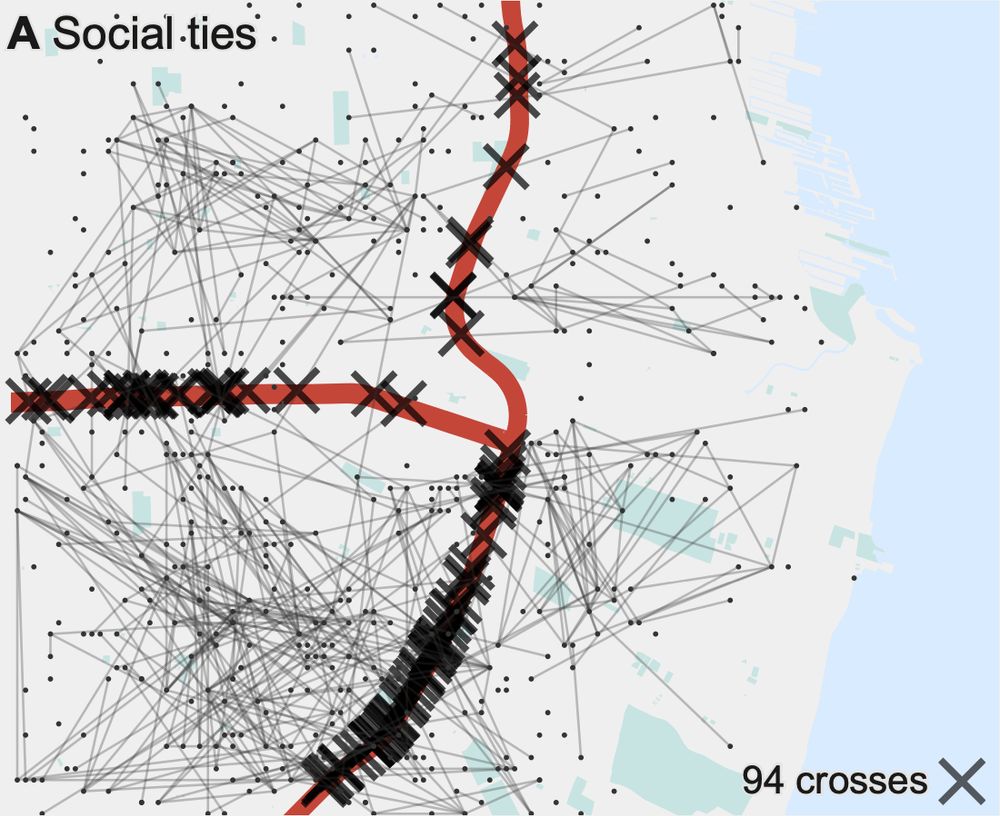
March 5, 2025 at 7:57 AM
🎉 New paper in PNAS: Urban highways are barriers to social ties
https://www.pnas.org/doi/10.1073/pnas.2408937122
Highways are barriers that cut opportunities for social ties. We quantify this effect by overlaying the US highway network with millions of social ties from Twitter.
https://www.pnas.org/doi/10.1073/pnas.2408937122
Highways are barriers that cut opportunities for social ties. We quantify this effect by overlaying the US highway network with millions of social ties from Twitter.
Reposted by Johannes Wachs
"Urban Highways Are Barriers to Social Ties" out on PNAS!
The 1st large-scale measure of how highways weaken social connections between the communities they separate. This barrier effect is strong in the 50 largest US cities--especially for low-income Black communities.
www.pnas.org/doi/10.1073/...
The 1st large-scale measure of how highways weaken social connections between the communities they separate. This barrier effect is strong in the 50 largest US cities--especially for low-income Black communities.
www.pnas.org/doi/10.1073/...
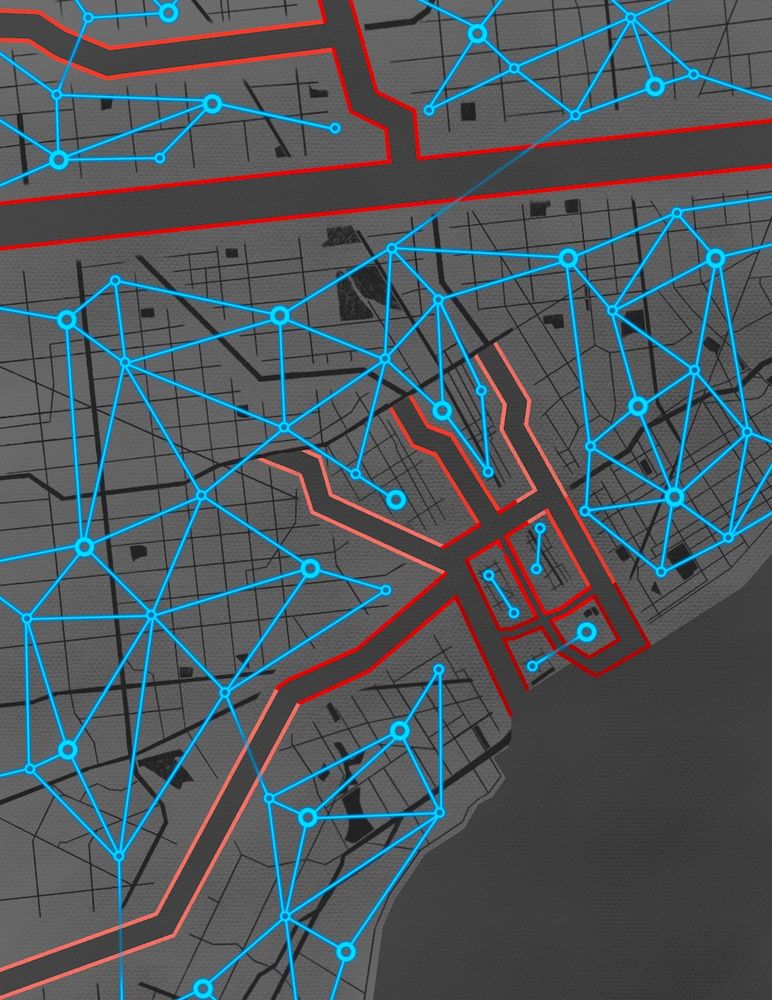
March 5, 2025 at 7:08 AM
"Urban Highways Are Barriers to Social Ties" out on PNAS!
The 1st large-scale measure of how highways weaken social connections between the communities they separate. This barrier effect is strong in the 50 largest US cities--especially for low-income Black communities.
www.pnas.org/doi/10.1073/...
The 1st large-scale measure of how highways weaken social connections between the communities they separate. This barrier effect is strong in the 50 largest US cities--especially for low-income Black communities.
www.pnas.org/doi/10.1073/...
Reposted by Johannes Wachs

March 5, 2025 at 10:58 AM
Reposted by Johannes Wachs
23/250 is Large language models reduce public knowledge sharing on online Q&A platforms
This makes me wonder if people are answering Stack Overflow questions with ChatGPT answers . . .
This makes me wonder if people are answering Stack Overflow questions with ChatGPT answers . . .

Large language models reduce public knowledge sharing on online Q&A platforms
Abstract. Large language models (LLMs) are a potential substitute for human-generated data and knowledge resources. This substitution, however, can present
doi.org
January 31, 2025 at 10:09 PM
23/250 is Large language models reduce public knowledge sharing on online Q&A platforms
This makes me wonder if people are answering Stack Overflow questions with ChatGPT answers . . .
This makes me wonder if people are answering Stack Overflow questions with ChatGPT answers . . .
Reposted by Johannes Wachs
🧵🧪 New paper alert! We studied how firms consume information by analyzing online reading patterns across millions of organizations. Some fascinating patterns emerged... (1/7)
November 7, 2024 at 10:18 AM
🧵🧪 New paper alert! We studied how firms consume information by analyzing online reading patterns across millions of organizations. Some fascinating patterns emerged... (1/7)
Reposted by Johannes Wachs
AI for science could be more impactful than chatbots. It is already helping win Nobel prizes and accelerating drug development and materials discovery.
Today we published an essay about it: why it matters, how it’s happening and its implications. Here is a summary from an econ / social sci lens.
Today we published an essay about it: why it matters, how it’s happening and its implications. Here is a summary from an econ / social sci lens.

November 26, 2024 at 10:39 AM
AI for science could be more impactful than chatbots. It is already helping win Nobel prizes and accelerating drug development and materials discovery.
Today we published an essay about it: why it matters, how it’s happening and its implications. Here is a summary from an econ / social sci lens.
Today we published an essay about it: why it matters, how it’s happening and its implications. Here is a summary from an econ / social sci lens.
Reposted by Johannes Wachs
New preprint on innovation in OSS /w Gabor Meszaros: arxiv.org/abs/2411.14894
We extract library import statements from Stack Overflow posts in 12 languages. These elementary building blocks of code appear at a slower rate as ecosystems grow. But novel combos of libraries grow linearly.
We extract library import statements from Stack Overflow posts in 12 languages. These elementary building blocks of code appear at a slower rate as ecosystems grow. But novel combos of libraries grow linearly.

November 25, 2024 at 12:20 PM
New preprint on innovation in OSS /w Gabor Meszaros: arxiv.org/abs/2411.14894
We extract library import statements from Stack Overflow posts in 12 languages. These elementary building blocks of code appear at a slower rate as ecosystems grow. But novel combos of libraries grow linearly.
We extract library import statements from Stack Overflow posts in 12 languages. These elementary building blocks of code appear at a slower rate as ecosystems grow. But novel combos of libraries grow linearly.
New preprint on innovation in OSS /w Gabor Meszaros: arxiv.org/abs/2411.14894
We extract library import statements from Stack Overflow posts in 12 languages. These elementary building blocks of code appear at a slower rate as ecosystems grow. But novel combos of libraries grow linearly.
We extract library import statements from Stack Overflow posts in 12 languages. These elementary building blocks of code appear at a slower rate as ecosystems grow. But novel combos of libraries grow linearly.

November 25, 2024 at 12:20 PM
New preprint on innovation in OSS /w Gabor Meszaros: arxiv.org/abs/2411.14894
We extract library import statements from Stack Overflow posts in 12 languages. These elementary building blocks of code appear at a slower rate as ecosystems grow. But novel combos of libraries grow linearly.
We extract library import statements from Stack Overflow posts in 12 languages. These elementary building blocks of code appear at a slower rate as ecosystems grow. But novel combos of libraries grow linearly.
Hey #EconSky, I'm on the job market with an #EconJMP about open source software. OSS is a global public good, widely used and provided by the private sector, but the target of recent industrial policy.
Paper: jeffgortmaker.com/files/Open_S...
1/
Paper: jeffgortmaker.com/files/Open_S...
1/
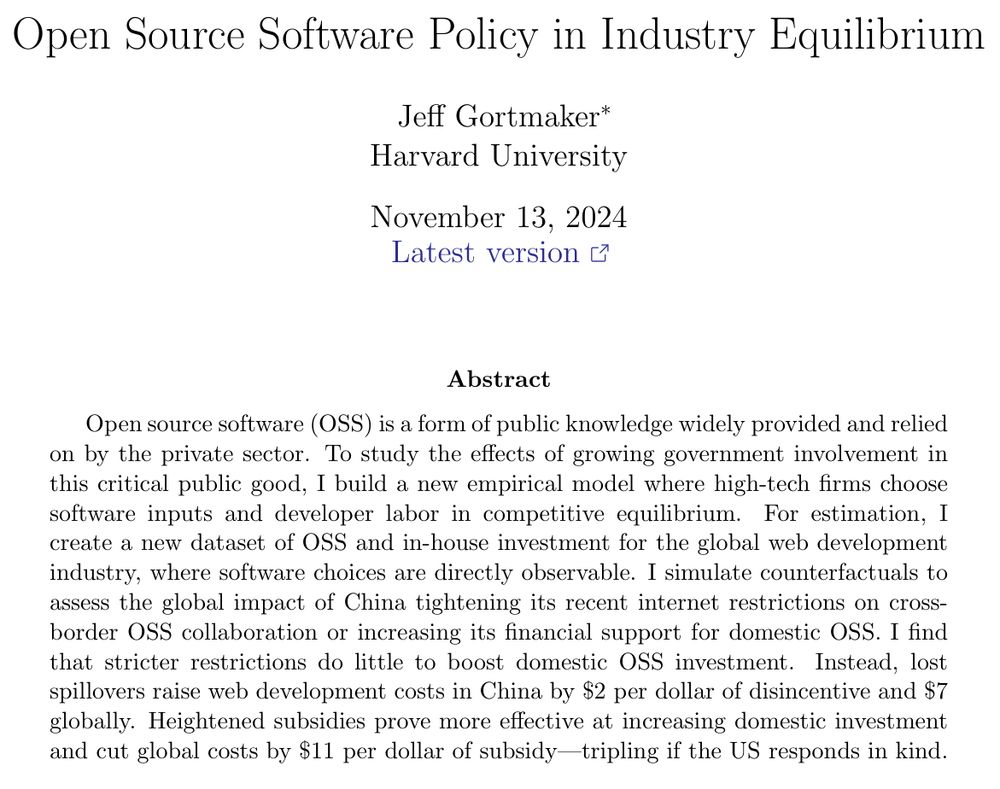
November 18, 2024 at 9:17 PM
Reposted by Johannes Wachs
Our paper on the effect of ChatGPT on activity on @stackoverflow.com.web.brid.gy is out: academic.oup.com/pnasnexus/ar...
@maria-drc.bsky.social, Nadzeya Laurentsyeva & I find a 25% decrease in activity on SO within 6 months of #ChatGPT 's release vs counterfactuals.
Why does it matter?
@maria-drc.bsky.social, Nadzeya Laurentsyeva & I find a 25% decrease in activity on SO within 6 months of #ChatGPT 's release vs counterfactuals.
Why does it matter?


November 15, 2024 at 9:28 AM
Our paper on the effect of ChatGPT on activity on @stackoverflow.com.web.brid.gy is out: academic.oup.com/pnasnexus/ar...
@maria-drc.bsky.social, Nadzeya Laurentsyeva & I find a 25% decrease in activity on SO within 6 months of #ChatGPT 's release vs counterfactuals.
Why does it matter?
@maria-drc.bsky.social, Nadzeya Laurentsyeva & I find a 25% decrease in activity on SO within 6 months of #ChatGPT 's release vs counterfactuals.
Why does it matter?
Our paper on the effect of ChatGPT on activity on @stackoverflow.com.web.brid.gy is out: academic.oup.com/pnasnexus/ar...
@maria-drc.bsky.social, Nadzeya Laurentsyeva & I find a 25% decrease in activity on SO within 6 months of #ChatGPT 's release vs counterfactuals.
Why does it matter?
@maria-drc.bsky.social, Nadzeya Laurentsyeva & I find a 25% decrease in activity on SO within 6 months of #ChatGPT 's release vs counterfactuals.
Why does it matter?


November 15, 2024 at 9:28 AM
Our paper on the effect of ChatGPT on activity on @stackoverflow.com.web.brid.gy is out: academic.oup.com/pnasnexus/ar...
@maria-drc.bsky.social, Nadzeya Laurentsyeva & I find a 25% decrease in activity on SO within 6 months of #ChatGPT 's release vs counterfactuals.
Why does it matter?
@maria-drc.bsky.social, Nadzeya Laurentsyeva & I find a 25% decrease in activity on SO within 6 months of #ChatGPT 's release vs counterfactuals.
Why does it matter?
Reposted by Johannes Wachs
I'm hiring a postdoc in beautiful Budapest
at the Center for Collective Learning at Corvinus U to work on the econ & geography of software and digitalization! Collaborate with a wonderful cluster of people at CCL &
ANET/NETI Labs. 30 months, no teaching req. Deadline Jan 30 tinyurl.com/4rn86v84
at the Center for Collective Learning at Corvinus U to work on the econ & geography of software and digitalization! Collaborate with a wonderful cluster of people at CCL &
ANET/NETI Labs. 30 months, no teaching req. Deadline Jan 30 tinyurl.com/4rn86v84
December 5, 2023 at 3:41 PM
I'm hiring a postdoc in beautiful Budapest
at the Center for Collective Learning at Corvinus U to work on the econ & geography of software and digitalization! Collaborate with a wonderful cluster of people at CCL &
ANET/NETI Labs. 30 months, no teaching req. Deadline Jan 30 tinyurl.com/4rn86v84
at the Center for Collective Learning at Corvinus U to work on the econ & geography of software and digitalization! Collaborate with a wonderful cluster of people at CCL &
ANET/NETI Labs. 30 months, no teaching req. Deadline Jan 30 tinyurl.com/4rn86v84
Reposted by Johannes Wachs
Paper is out! Together with Camelia Oprea and Markus Strohmaier, we have explored the potential impact of toxic comments on Wikipedia:
academic.oup.com/pnasnexus/ar...
academic.oup.com/pnasnexus/ar...

Toxic comments are associated with reduced activity of volunteer editors on Wikipedia
Abstract. Wikipedia is one of the most successful collaborative projects in history. It is the largest encyclopedia ever created, with millions of users worldwi
academic.oup.com
December 6, 2023 at 7:02 AM
Paper is out! Together with Camelia Oprea and Markus Strohmaier, we have explored the potential impact of toxic comments on Wikipedia:
academic.oup.com/pnasnexus/ar...
academic.oup.com/pnasnexus/ar...
I'm hiring a postdoc in beautiful Budapest
at the Center for Collective Learning at Corvinus U to work on the econ & geography of software and digitalization! Collaborate with a wonderful cluster of people at CCL &
ANET/NETI Labs. 30 months, no teaching req. Deadline Jan 30 tinyurl.com/4rn86v84
at the Center for Collective Learning at Corvinus U to work on the econ & geography of software and digitalization! Collaborate with a wonderful cluster of people at CCL &
ANET/NETI Labs. 30 months, no teaching req. Deadline Jan 30 tinyurl.com/4rn86v84
December 5, 2023 at 3:41 PM
I'm hiring a postdoc in beautiful Budapest
at the Center for Collective Learning at Corvinus U to work on the econ & geography of software and digitalization! Collaborate with a wonderful cluster of people at CCL &
ANET/NETI Labs. 30 months, no teaching req. Deadline Jan 30 tinyurl.com/4rn86v84
at the Center for Collective Learning at Corvinus U to work on the econ & geography of software and digitalization! Collaborate with a wonderful cluster of people at CCL &
ANET/NETI Labs. 30 months, no teaching req. Deadline Jan 30 tinyurl.com/4rn86v84
Reposted by Johannes Wachs
🚨Amenity complexity and urban locations of socio-economic mixing🚨 -- our paper is out in EPJ Data Science
We combine urban mobility data with economic complexity ideas to identify places where socio-economically diverse people are more likely to meet.
We combine urban mobility data with economic complexity ideas to identify places where socio-economically diverse people are more likely to meet.

Amenity complexity and urban locations of socio-economic mixing - EPJ Data Science
Cities host diverse people and their mixing is the engine of prosperity. In turn, segregation and inequalities are common features of most cities and locations that enable the meeting of people with d...
epjdatascience.springeropen.com
November 15, 2023 at 10:11 AM
🚨Amenity complexity and urban locations of socio-economic mixing🚨 -- our paper is out in EPJ Data Science
We combine urban mobility data with economic complexity ideas to identify places where socio-economically diverse people are more likely to meet.
We combine urban mobility data with economic complexity ideas to identify places where socio-economically diverse people are more likely to meet.

